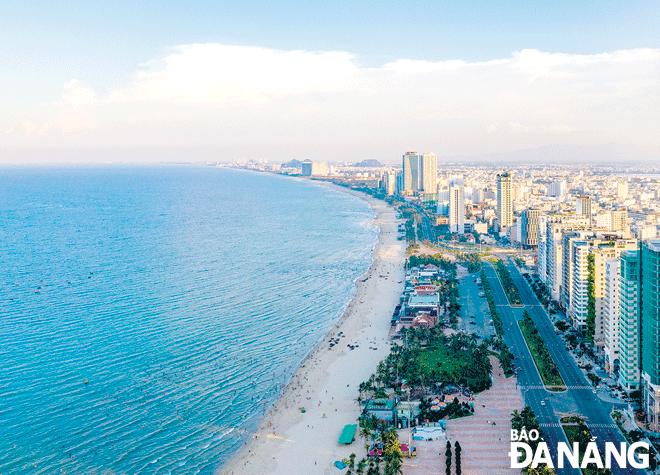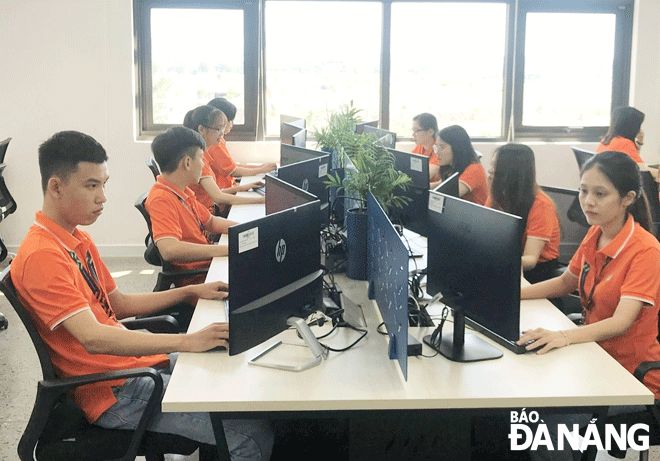Motivations for building Da Nang into a smart city
According to the latest announcement by the Viet Nam Software and IT Services Association (VINASA), Da Nang has won the Viet Nam Smart City Award 2022, the third time the central city has been honoured with this prestigious award.
Additionally, Da Nang has won 3 specialized prizes for smart transportation and logistics city; attractive city for innovation start-ups; and smart city apps that have been applied and brought benefit to people, businesses, communities and society.
 |
| Da Nang is making every effort to implement a project on building smart city with the aim to put scientific and technological achievements into application, ensuring the best quality of life for residents. Photo: HUY TUAN |
Efforts are bearing fruit
Launched by VINASA, the annual prestigious award aims to promote digital transformation, the application of information technology, and the building of smart cities across the country, as well as honour achievements of cities, urban areas, industrial parks, and technological solutions.
Also, it contributes to appealing for investment into cities, urban areas, industrial parks, projects and solutions; and boosting supply - demand connection for the development of smart cities.
Thus, since it was first held in 2020, Da Nang has been honoured with the Viet Nam Smart City Award for three consecutive years in 2020, 2021 and 2022.
The abovementioned results correspond to a period of nearly 4 years when the city has implemented a project on building Da Nang into a smart city during the 2018-2025 period, with orientations to 2030.
Between 2019 and 2021, Da Nang completed 12 out of the 13 goals set in the project.
Specifically, the MAN urban network was expanded, connecting to Party agencies and non-business units. The city’s data centre ensured the capacity of installing and deploying databases and smart applications. A centre for monitoring, operating, centralised processing and multitasking was established to connect and analyse interdisciplinary data, and provide socio-economic and urban indicators.
Also, the smart traffic monitoring system through smart cameras, automatic and centralised traffic light control system, and the online traffic portal at phase 1, were basically completed.
Besides, many technological solutions were effectively implemented. In particular, the databases of the healthcare sector, and electronic health records associated with electronic medical records, were completed. E-hospitals and a smart hospital were established.
The smart city model in Lien Chieu District, along with a number of smart urban clusters such as High-tech Park, Software Park No. 2, and Centralised Information Technology Park, were deployed.
Meanwhile, the final goal of piloting the smart travel cards is expected to be announced and implemented by late 2022.
 |
| Employees are seen working at the Central Viet Nam FPT Software Co., Ltd. Photo: M.Q |
Building a unified, transparent smart city model
Mr. Pham Sy Nguyen, the Director of Hai Chau District-based Innova Education and Technology JSC, remarked that, in recent years, Da Nang has recorded impressive progress in building a smart city.
He added being continuously honoured with the Viet Nam Smart City Award will open up more opportunities for local small and medium-sized technology enterprises to coordinate with large technology enterprises and corporations to together build smart city model.
Mr. Nguyen underlined a necessity for Da Nang to develop more standards on smart city building, and have a clear legal framework, so as to protect residents’ personal data. The focus will be on making a long-term but clear strategy and a specific plan, as well as ensuring 5G, 4G digital infrastructure.
“The construction and transformation of an old ecosystem into an advanced and modern one are in need of support from the whole political system. For us, Innova is joining professional associations with 2,000 - 5,000 high-quality technology engineers, which will be a huge resource for the city to boost digital transformation. Therefore, Da Nang needs to have a specific plan to coordinate with such companies and business associations when building a smart city in various fields" Director Nguyen added.
Mr. Doan Duc Thanh, General Director of the Conando Communications and Technology JSC headquartered in Hai Chau District, said that Da Nang is completely worthy of being honoured as a smart city for 3 consecutive years.
He expects his hope that the city will help optimise resources to promote the sustainable development of local businesses and address such issues as environment and social security.
Mr. Thanh also pointed out some of the city’s shortcomings in building a smart city. In particular, there are no effective solutions in the management, planning and development of smart cities appropriately based on new technology platforms like artificial intelligence (AI) and SMAC (social, mobile, analytics and cloud) trend.
He also stressed the need of the active and effective participation of people and businesses in the construction of a smart city because the work is a complicated, long-term and expensive task.
Deputy Director of the Da Nang Department of Information and Communications Tran Ngoc Thach highlighted, to concretise the goals set in the smart city project, in the coming time, the city will prioritise developing infrastructure for 5G mobile network and Internet of Things (IoT); upgrading and expanding the city's data centre with a cloud computing platform; building a network of surveillance camera systems citywide; completing a shared data warehouse to ensure the ability to handle a variety of data; continuing to upgrade and complete specialised monitoring centres; and forming a synchronous and unified urban infrastructure database system on the GIS geographic information system with full layers of land, construction, and traffic data.
To accomplish the above goals, the municipal Department of Information and Communications will continue to coordinate with units and localities to effectively deploy and use specialised applications, databases, and online public services.
Attention will be paid to promoting domestic and international cooperation, and attracting resources and technological solutions from organisations, businesses and experts to support smart city deployment. Heed will be on appealing for support, participation, and companionship of organisations, businesses and dwellers in carrying out the smart city project.
Reporting by M.QUE, C.THANG - Translating by M.DUNG